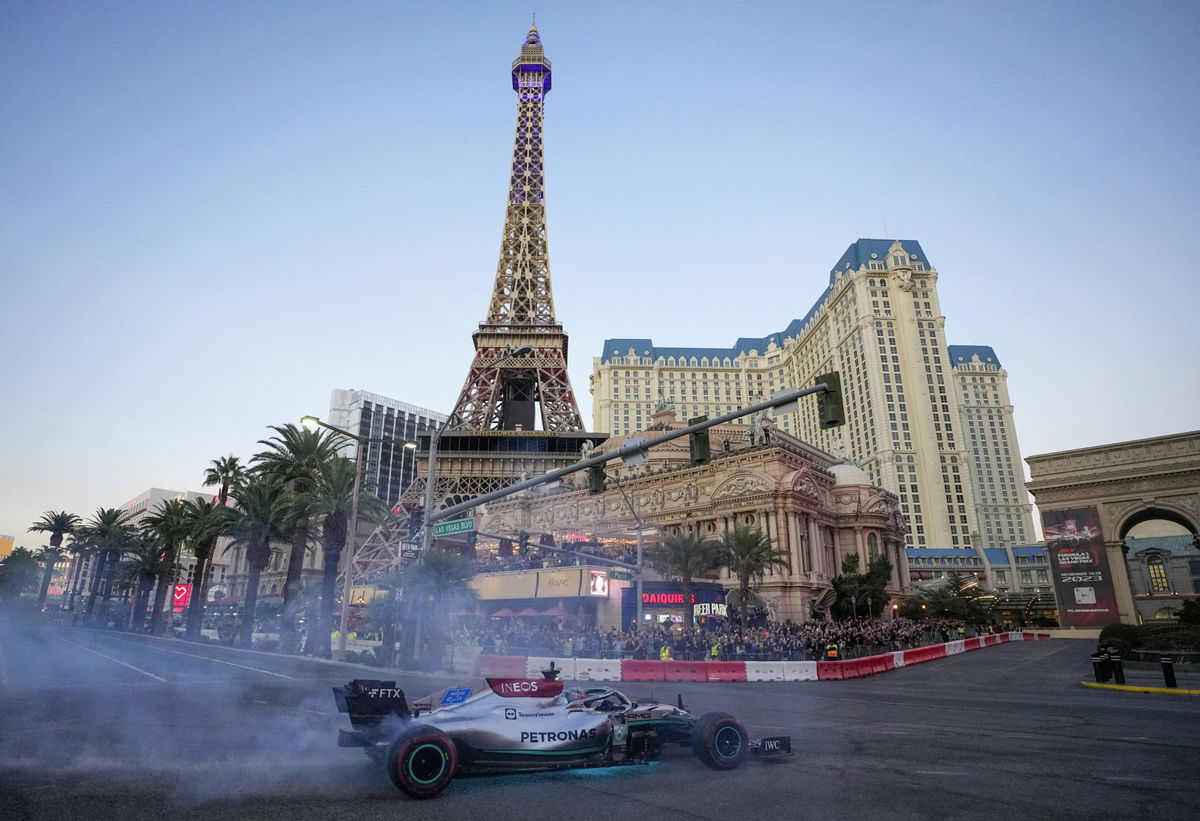
USA Today via Reuters
Nov 5, 2022; Las Vegas, Nevada, USA; Mercedes-AMG Petronas driver George Russell spins his car on the track during the Formula One Las Vegas Grand Prix Launch Party at Las Vegas Strip. Mandatory Credit: Ray Acevedo-USA TODAY Sports

USA Today via Reuters
Nov 5, 2022; Las Vegas, Nevada, USA; Mercedes-AMG Petronas driver George Russell spins his car on the track during the Formula One Las Vegas Grand Prix Launch Party at Las Vegas Strip. Mandatory Credit: Ray Acevedo-USA TODAY Sports
Formula 1 is the world’s premier motorsport series, and it’s no secret that the sport is big business. In recent years, F1 has seen a surge in popularity, particularly in the United States. Due in part to the success of the Netflix docuseries Drive to Survive, which has given fans a behind-the-scenes look at the sport and its drivers.
Watch What’s Trending Now!
One of the most anticipated races on the F1 calendar is the upcoming Las Vegas Grand Prix, which is scheduled to take place on November 18th. The race is expected to be a huge spectacle, with a celebrity-studded guest list and a dazzling night race under the lights of Sin City. However, critics and fans are questioning whether Formula 1 is over-relying on the Las Vegas GP to exploit fan sentiment and increase profitability.
ADVERTISEMENT
The CNBC verdict over the Las Vegas GP
In an interview with CNBC, Liberty Media CEO Greg Maffei acknowledged that the Las Vegas Grand Prix is a major investment for the company. However, he also said that he believes the race will be “enduring” and will have a positive impact on F1’s interest among sponsors and fans. When questioned about the initial costs for the Las Vegas GP and the cash flow volume, going forward, Maffei answered:
“On the initial costs, we’ve got an opening ceremony that’s grand. Won’t have that in future years. We had a bunch of initial start-up costs around security, around temporary bridges, around optimizing the fan experience in a hurry that over time we’re going to be optimized both for the quality of the fan experience, but also for probably improved profitability.”
Top Stories
“Have Some Shame”- Fans Tear Apart F1 Pundits’ Shocking 2025 Driver Ranking

Is Max Verstappen Belgian or Dutch?

After Lewis Hamilton’s $10 BN Boost to Ferrari, Will Aramco Make Big Money Investment

McLaren F1 Boss Zak Brown Clears the Air Around Lando Norris’ Future Amid “Noise” From Mercedes’ Camp

Liam Lawson’s Sisters Gave Up Their Dancing Careers to Support the Red Bull Star’s F1 Dream

“But the impact, not just of the race, but what it will do to our interest among sponsors, what it will do to our interest among fans, we think that is going to be enduring from this year forward.”
ADVERTISEMENT
The Pit Building is READY! 🔥#LasVegasGP #F1 pic.twitter.com/sqEAzEgF8O
— F1 Las Vegas (@F1LasVegas) November 10, 2023
Maffei also said that Liberty Media is looking for ways to invest in F1, including capex and potential acquisitions of other IP opportunities. This suggests that F1 is not planning to put all its eggs in the Las Vegas Grand Prix basket but to diversify. After all, Formula 1 is a business, and businesses are ultimately motivated by profit. So, it’s understandable that Liberty Media is excited about the potential of the Las Vegas Grand Prix to generate a lot of revenue.
ADVERTISEMENT
Read More: “Tear It Down & Get Outta Town”: F1’s Big Las Vegas GP Reveal Trashed by Fans
But this sentiment about the Las Vegas GP is not without its share (and important ones too) of contrasting viewpoints from countless experts and fans alike.
ADVERTISEMENT
Las Vegas GP: A narrative of contrasts
Some fans have also expressed concerns that the Las Vegas GP is more about entertainment than racing. The race weekend features a wide range of off-track activities, including celebrity appearances, lavish parties, and concerts. This has led to some fans feeling that the focus of the event has shifted away from the racing itself.
F1 CEO Stefano Domenicali has defended the race, arguing that it is important to expand the sport’s reach into new markets. He has also pointed out that the Las Vegas GP is expected to generate a significant economic impact for the city. However, some experts believe that F1 is taking a risk by over-relying on the Las Vegas GP. They argue that the sport needs to be careful not to alienate its core fan base and that it is important to maintain a balance between entertainment and racing.
Just in🚨@johnlegend and @tiesto join us in our epic Opening Ceremony lineup 🤩🙌
November 15th can't come soon enough! 🕺#LasVegasGP #F1 pic.twitter.com/S5p5sYilqr
— F1 Las Vegas (@F1LasVegas) November 6, 2023
ADVERTISEMENT
If F1 does become too reliant on the Las Vegas GP, it could have a number of negative consequences. Here they are:
- A decrease in the quality of racing. If F1 is focused on attracting wealthy spectators who are more interested in the entertainment value of the event than the racing itself, it is less likely to make the changes necessary to improve the on-track product.
- Damage F1’s reputation. If fans feel that the sport is becoming too commercialized and that the racing is being sacrificed for entertainment, they are less likely to support it. This could lead to a decline in viewership and sponsorship revenue.
- A shortage of skilled workers in the motorsport industry. If F1 becomes too focused on attracting wealthy spectators and not enough on developing young talent, it could face a shortage of qualified engineers, mechanics, and other personnel in the future.
- Make F1 less accessible to new fans. If the sport becomes too expensive and elitist, it could be difficult for new fans to get involved. This could lead to a decline in the overall popularity of F1 in the long term.
- Damage the relationship between F1 and its fans. If fans feel that F1 is only interested in their money and not their passion for the sport, it could lead to a loss of trust and support. This could make it more difficult for F1 to attract and retain fans in the future.
WATCH THIS STORY | Most Dangerous Crashes in F1 History
ADVERTISEMENT
Whether or not F1 is over-relying on the Las Vegas Grand Prix is a matter of opinion. It is important to note that these are just potential consequences, and it is not clear whether any of them will actually come to pass. The Las Vegas GP is a major investment for the company. It will be interesting to see how the race performs and whether it meets Liberty Media’s expectations.
“The views expressed are those of the author and do not necessarily reflect the views of EssentiallySports.”
ADVERTISEMENT
ADVERTISEMENT
ADVERTISEMENT

